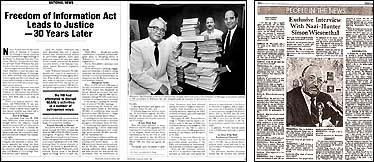

Examining and
changing
discrimination
and injustice

he principle that all men are created equal is the foundation of a democratic society.
Conversely, preconceived opinions of people based on race, personal belief, or social standing form the structure of prejudice and bigotry—in which attainment of equal rights is a constant struggle.
Freedom has been a consistent champion of minority and individual rights—the right to fair and equal treatment, both under the law and within the broader society in which we live.
Ethnic Discrimination

|
A probe of Native Americans’ rights violations led to an investigative feature on efforts to wrest control of valuable mineral rights from the Navajo Nation in the American Southwest. Coverage detailed the means employed, which included fomenting unrest and outright violence to deny the Navajos their due.
In examining injustices toward Native Americans, in 1986 Freedom interviewed John Trudell, former national chairman of the American Indian Movement. Trudell revealed evidence of underhanded activities against Native Americans on the part of government officials and workers charged with their well-being.
Freedom has analyzed causes of discrimination against ethnic minorities, including how a social climate which nurtures prejudice is formed. In two features in the 1980s, researchers scrutinized media’s role in fomenting prejudicial treatment against Hispanics in California. The story revealed how sensationalized news media coverage inflamed the 1943 Los Angeles riots in which U.S. servicemen hunted, tormented and beat Hispanic men. Freedom also provided insight into the role of media in modern-day discrimination against ethnic minorities—including prejudice within the media itself and stereotyped coverage of minorities.
Discrimination is often most apparent in the work place, due to disparity in employee treatment and uneven opportunity for advancement and promotions.
Accounts of discrimination against African-American employees in both government and private settings have been documented and detailed in Freedom over the years. An extensive probe of racial discrimination in certain offices of the U.S. Internal Revenue Service in the late 1980s and early 1990s formed the basis of testimony presented to the United States Senate Committee on Governmental Operations. Freedom’s exposure included evidence of promotions denied, management positions closed to qualified minorities, and job ratings downgraded so unqualified white applicants could move into jobs instead of qualified black applicants.
In the private sector, Freedom has exposed “glass ceilings” placed on minority advancement—particularly where hypocritical institutions present a sanctimonious image of equal opportunity on the one hand yet foster prejudice against minorities on the other.
An Uneven Playing Field
Throughout history, individuals have been rendered powerless when the social system that should guarantee their equality ignores them or, worse, turns against them. This is particularly the case where false reports against individuals can go unchecked.

| ||
 |
Freedom has long been a forum for issues of social justice. Coverage has included investigating iniquities spawned by the McCarthy era and providing a voice to Simon Wiesenthal when he came under heavy fire in the 1970s. |
A review of recent U.S. history rapidly narrows in on the McCarthy era and its House Un-American Activities Committee (HUAC) as a paradigm of injustice based on false reports.
Freedom featured the story of Frank Wilkinson, an official with the California State Housing Authority who was targeted by the California equivalent of HUAC, known as the “Little HUAC.” Wilkinson, adamantly opposed to the concept of the Committee, refused to answer questions. He subsequently lost his job and spent a year in prison (1961 to 1962) for contempt of Congress.
Through the use of the Freedom of Information Act, documentation was eventually obtained from the FBI which showed that the agency withheld vital information from Congress and the courts which could have kept Wilkinson from prison. Thus, more than 25 years later, at 74 years old, Frank Wilkinson won a landmark decision against the FBI and absolved himself.
In some scenarios of injustice, however, those without some advantage of personal prominence are often heard too late, if at all.
In one such case, in the early 1970s Freedom documented the fate of a U.S. government employee who complained of flaws in one version of the United States’ F-111 fighter plane. Early in the design studies, Duane Yorke noted the plane was “grossly deficient in all avenues of performance.” After protesting that officials were ignoring the evidence, Yorke was committed to a mental ward, confined and given electroshock. That version of the F-111 was later scrapped as it was too heavy—precisely what Yorke had tried to tell officials. The Pentagon told Freedom there had been 58 non-combat crashes and losses as a result of the flawed design.
When the system designed to enforce law and justice—and prevent injustice—is itself corrupted by prejudice, the outcome can be ruined lives.
Starting in the early 1980s, Freedom investigated claims of injustice in the renowned case of Elmer “Geronimo” Pratt, the Vietnam war hero and Los Angeles Black Panther leader who was imprisoned for a murder he steadfastly maintained he did not commit. The investigation led Freedom researchers from San Quentin, where Pratt was incarcerated, to a prison in the hills of Kentucky where a former FBI informant who turned state’s evidence against the Panthers professed to know the truth about Pratt’s conviction. Documents were also obtained under the Freedom of Information Act which showed Pratt was long a target of the infamous “counter-intelligence program” of J. Edgar Hoover’s FBI because of his outspoken leadership within the black community. Evidence mounted that the prosecution had suppressed vital evidence and that Pratt had never received a fair trial.
In 1997, at the end of a long journey through the labyrinth of the criminal justice system, and 27 years in prison, Pratt was freed. A former FBI agent of 25 years who provided important testimony absolving Pratt of murder credited Freedom for helping keep Pratt’s case before the public eye.
Freedom also probed reports in the late 1970s of U.S. Department of Justice Law Enforcement Assistance Administration (LEAA) discrimination against minority youth. According to a study done at the time, LEAA’s juvenile delinquency prevention program had the effect of creating two separate juvenile justice systems: one for white middle income youth and another for minority and lower income youth.
Impelled by an alarming trend of inequitable treatment of minorities by the courts, in 1996 Freedom published a searching and comprehensive investigative feature on discrimination in the American judicial system. Entitled “The Black and White of Justice,” coverage of multiple facets of the issue delved into the loss of public confidence in the justice system, and how racism and bigotry influence perception and treatment of guilt or innocence.
Freedom published compelling evidence of the effects of such discrimination in the legal/judicial system, and the unconscionable levels it has reached at various points in American history. Statistics and corroborating evidence also documented how the nation’s drug enforcement efforts are overwhelmingly concentrated on blacks and Hispanics, including the concerted law enforcement effort to apprehend and incarcerate minority violators in disproportionate numbers.
Minority Guinea Pigs
Discrimination can assume its most insidious forms—with the most destructive results on individuals—when mixed with unethical practices in science and medicine.
Freedom has exposed numerous incidents of minorities being singled out for human testing of dangerous drugs and other harmful “treatments.” One underlying cause for the discriminatory treatment has been the ill-founded stereotyping of minorities as the chief conveyors of crime, violence and other societal illnesses.
Such bigoted stereotyping led to a plan in Los Angeles in the 1970s to establish a “violence center” in which blacks and Hispanics would be treated for “violent tendencies” with chemical castration and electrodes passing electric current to the brain. The Church of Scientology and Freedom were among those who vociferously condemned the plan, which was subsequently dropped. Freedom also conducted extensive investigations into its orchestrator, Dr. Louis Jolyn West, a psychiatrist whose views of minorities are consistent with his peers in the psychiatric industry.
In the 1980s, Freedom exposed documents obtained under the Freedom of Information Act which confirmed that blacks were singled out as human guinea pigs for psychiatric drug testing in the 1950s and 1960s. For instance, records showed extensive testing of LSD and other hallucinogenic drugs on blacks between 1953 and 1958 in a CIA-sponsored research program at the National Institute for Mental Health’s Addiction Research Center in Lexington, Kentucky. Freedom also published accounts of drug testing on blacks in other medical facilities and prisons.
Biological warfare testing conducted on unwitting citizens during the 1950s and 1960s, as exposed by Freedom, also at times targeted minorities. Experimental dissemination of the whooping cough virus in Florida in the 1960s, for example, was heaviest in a region inhabited by African-Americans. Investigation by Freedom revealed that the testing also led to several deaths—mostly of young children. [See Government Reform]
Solutions
In its extensive coverage of issues of social injustice, Freedom has underscored and highlighted solutions.
It is commonly accepted today that a poor education lends itself to both bigotry and criminality. Freedom has featured workable education programs which use the education methods developed by
The general decrease of morality in society has contributed to overloaded court systems, which is part of the problem that results in injustice. Freedom has covered the work of groups and individuals to improve morality, such as the highly successful Way to Happiness program based on the non-religious common-sense moral code, The Way to Happiness, written by Mr. Hubbard. Criminon, the criminal rehabilitation program which uses The Way to Happiness, has been featured in Freedom for its success, including an unprecedented low rate of recidivism among those who have completed the program.
While the problems of our legal/judicial system and the outcomes of injustice make the most headlines, Freedom has featured judges and programs that are getting results. Among these are the relatively new “drug courts” which sentence offenders to programs for rehabilitation rather than to already over-crowded prisons.
Freedom has also highlighted groups and individuals who work tirelessly for the rights of citizens to equality and justice—from the National Commission Against Repressive Legislation (NCARL) to the National Association for the Advancement of Colored People (NAACP).
Freedom will continue to give prominence to issues of equality and social justice in its pages, and work to make these principles apply to everyone.

